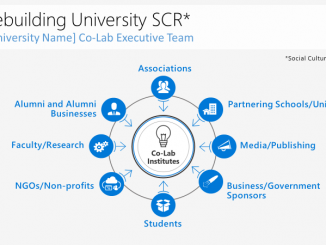
Opening Insights: The Glory Days Are GONE
Gone are the days that tech giants and their CEOs can rely on the naive optimism of the politicians, academics and the media. The concerns and research about the negative effects and applications of technology to our lives, jobs, relationships, economies and communities is becoming increasingly publicized and known, such as:
- Tech Giants and Participants Limiting Screen Time for Their Kids (i.e. Steve Jobs)
- Intentionally Induced Dopamine Screen Effect (i.e. "The Like Button")
- Conditioned Technology Addictions (i.e. "The Like Button")
- Election Meddling
In the last year many tech leaders and visionaries have taken note of the realities of their behaviors and the social cultural cost of their high share prices. They have owned up their transgressions and many are seeking solutions to the "distracted" and "addictive" world they have contributed and participated in creating. This reality was highlighted by Alyssa Newcomb, in her article published by NBC News. Explore some key snippets of her article below and ask yourself, if you are content to just know and talk about the problem, or if you want to be a part of the solution, a movement to reverse this trend?
Informational Insights: Market Share or Ethics?
Facebook is a 'living, breathing crime scene,' says one former tech insider. "All of this combined to be a perfect storm," said Jonathan Taplin, director emeritus at the Annenberg Innovation Lab and author of "Move Fast and Break Things: How Facebook, Google and Amazon Cornered Culture and Undermined Democracy."
Even some high-profile voices in Silicon Valley, who started their own companies or were early employees at Facebook and Google, agree — and are doing so vocally. A number of early employees from Facebook and Google launched the Center for Humane Technology earlier this month, with the goal of "reversing the digital attention crisis and realigning technology with humanity's best interests."
Salesforce CEO Marc Benioff, an influential figure in the tech community, likened Facebook last month to Big Tobacco and said there's a need for regulation.
"We're the same as any other industry," Benioff told CNBC. "Financial services, consumer product goods, food — in technology, the government's going to have to be involved. There is some regulation but there probably will have to be more."
Facebook appears to already be trying to get in front of any potential regulation in the United States. CEO Mark Zuckerberg has pledged to "fix" Facebook this year to focus on "time well spent." Facebook said time spent by its users on the platform dropped 50 million hours per day after the company retooled its algorithm to focus more on friends and family, and less on publishers and brands.
Big tech may already simply be, well, too big, according to Taplin.
Facebook and Google combined to grab 88 percent of all new online advertising revenue last year, he said, and that may be a problem.
"The original idea of the internet was a very decentralized system and a democratic space where everyone could have a place to talk," Taplin said. "The big three online, Google, Facebook and Amazon, are more and more becoming monopolies, so it is a winner-takes-all business."
Corporate America is also getting in on the tech backlash. Unilever, the multibillion dollar consumer goods company that makes everything from food to cleaning and hygiene products, warned tech giants that it was willing to use its $9 billion advertising budget, much of it spent on Facebook and Google, as leverage to get the tech giants to clean up their acts. Last year, several consumer brands pulled their ads from Youtube after an investigation by The Times of London found that their ads were running next to videos of scantily clad children. YouTube vowed to urgently fix the issue.
[...]
Big tech's business practices are being put under the microscope, but so is the presence of technology in our daily lives — particularly with the emergence of smartphones.
Last month, active investor JANA Partners and the California State Teacher's Retirement System sent Apple's board of directors a letter asking them to "think differently" when it comes to kids.
The letter pointed to a number of studies purporting to show the effects technology has on children and teenagers.
[...]
The former Facebook and Google employees who mobilized to start the Center for Humane Technology are working alongside Common Sense, an advocacy group focusing on children and technology.
But addressing those concerns could mean rethinking what has made tech companies so successful. Tech business models "often encourage them to do whatever they can to grab attention and data and then to worry about the consequences later, even though those very same consequences may at times hurt the social, emotional and cognitive development of kids," James Steyer, CEO and founder of Common Sense, said this month. He called on the industry to "change its ways and improve certain practices."
And if ever there was an inflection point, and a critical and necessary place to do it, that time is 2018, according to experts. How tech companies handle this year could potentially be do or die.
Source: https://www.msn.com/en-us/news/other/silicon-valley-faces-make-or-break-moment-amid-big-tech-backlash/ar-BBJE6Cj
Possibilities for Consideration: Hear, Speak, Stand, Join?
We need to pay attention to the realities and warning signs of life. When we do this, we realize we are not alone and that we experience not just reality but the choice of freedom, the choice of partnership, the choice of opportunity and the choice of change. Consider the following question:
- What caught your interest or concern?
- Are the realities of the use, abuse and misuse of technology of concern to you?
- Are you aware of the impact of technology on yourself, your family, your workplace, your community and your life?
- How have the influences of technology affected you, your children, your family, work colleagues or community at large?
- Are you content with doing nothing, talking about the problem, looking for solutions or are you determined to do something?
If you are interested in exploring and finding solutions to these questions and more consider a FREE PWI Co-Lab Online Workshop.
Add Your Insight: Be the Change, Join With?
Technology gives us power,
but it does not and cannot tell us how to use that power.
Thanks to technology, we can instantly communicate across the world,
but it still doesn't help us know what to say.
RABBI LORD JONATHAN SACKS
The PWI Co-Lab opens the door to discovering and uncovering the tools and resources we need to unify, empower and communicate with others about the problems, answers and solutions we want to see. Life offers us many opportunities and directions, few paths lead to deliverable and measurable solutions... the PWI Co-Lab offers a path to the solution for the people, by the people, of the people.





